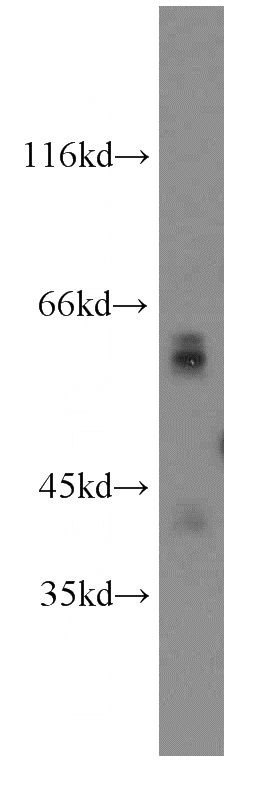-
Product Name
Glypican 4 antibody
- Documents
-
Description
Glypican 4 Rabbit Polyclonal antibody. Positive WB detected in A549 cells, human brain tissue, mouse kidney tissue. Observed molecular weight by Western-blot: 62 kDa
-
Tested applications
ELISA, WB
-
Species reactivity
Human,Mouse,Rat; other species not tested.
-
Alternative names
Glypican 4 antibody; Glypican 4/6 antibody; GPC4 antibody; GPC4/6 antibody; K glypican antibody
-
Isotype
Rabbit IgG
-
Preparation
This antibody was obtained by immunization of Glypican 4 recombinant protein (Accession Number: NM_001448). Purification method: Antigen affinity purified.
-
Clonality
Polyclonal
-
Formulation
PBS with 0.02% sodium azide and 50% glycerol pH 7.3.
-
Storage instructions
Store at -20℃. DO NOT ALIQUOT
-
Applications
Recommended Dilution:
WB: 1:200-1:2000
-
Validations

A549 cells were subjected to SDS PAGE followed by western blot with Catalog No:111090(GPC4 antibody) at dilution of 1:200
-
Background
Glypicans (GPCs) are a family of glycosylphosphatidylinositol (GPI)-anchored heparan sulphate proteoglycans (HSPGs) that may play a role in the control of cell division and growth regulation. In mammals, there are six GPCs (GPC1 to GPC6), all of which have a similar core-protein size of approx. 60 kDa and the clustering of glycosaminoglycan attachment site near the C-terminus. They are tethered to the cell surface by GPI linkages, which can be cleaved by endogenous phospholipases, thus releasing the protein. Human GPC4 is a 556-amino acid protein, and shows 93.5% identity to mouse K-glypican. The gene of GPC4 has been mapped to Xq26, and its mRNA is widely expressed in human tissues, including lung, kidney, heart, placenta, skeletal muscle, and pancreas. GPC4 has also been shown to be present in astrocytes, haematopoietic-progenitor and bone-marrow-stromal cells. Studies suggest that GPC4 is involved in the regulation of Wnt signaling and astrocyte GPC4 plays a role in formation of excitatory synapses. This antobody can recognize both full length (65 kDa) and cleaved (35 kDa) GPC4 as well as GPC6. (PMID: 9931407; 10585884; 22302992; 22722203)
-
References
- Allen NJ, Bennett ML, Foo LC. Astrocyte glypicans 4 and 6 promote formation of excitatory synapses via GluA1 AMPA receptors. Nature. 486(7403):410-4. 2012.
Related Products / Services
Please note: All products are "FOR RESEARCH USE ONLY AND ARE NOT INTENDED FOR DIAGNOSTIC OR THERAPEUTIC USE"
